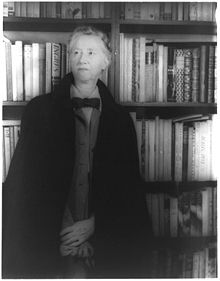Marianne Moore
italian pronunciation
Marianne Craig Moore (November 15, 1887 – February 5, 1972) was an American modernist poet, critic, translator, and editor. Her poetry is noted for formal innovation, precise diction, irony, and wit.
Moore was born in Kirkwood, Missouri, in the manse of the Presbyterian church where her maternal grandfather, John Riddle Warner, served as pastor. Her father, John Milton Moore, a mechanical engineer and inventor, suffered a psychotic episode, as a consequence of which her parents separated before she was born; Moore never met him. She and her elder brother, John Warner Moore, were reared by their mother, Mary Warner Moore. The family wrote voluminous letters to one another throughout their lives, often addressing each other by playful nicknames and using a private language.
Like her mother and her elder brother, Moore remained a devoted Presbyterian, strongly influenced by her grandfather, approaching her Christian faith as a lesson in strength vindicated through trials and temptations; her poems often deal with the themes of strength and adversity.[1] She thought "it was not possible to live without religious faith".[2] Moore lived in the St. Louis area until she was 16.[3] After her grandfather died in 1894, the three stayed with relatives near Pittsburgh for two years, then moved to Carlisle, Pennsylvania, where her mother found employment teaching English in a private girls school.
Moore's first professionally published poems appeared in The Egoist and Poetry in the spring of 1915. Harriet Monroe, the editor of the latter, would describe them in her biography as possessing "an elliptically musical profundity".[6]
Her second book, Observations, won the Dial Award in 1924. She worked part-time as a librarian during these years; then from 1925 to 1929, she edited The Dial magazine, a literary and cultural journal. This position in the literary and arts community extended her influence as an arbiter of modernist taste; much later, she encouraged promising young poets, including Elizabeth Bishop, Allen Ginsberg, John Ashbery, and James Merrill. When The Dial ceased publication in 1929, she moved to 260 Cumberland Street[9] in the Fort Greene neighborhood of Brooklyn, where she remained for thirty-six years. She continued to write while caring for her ailing mother, who died in 1947. For nine years before and after her mother's death, Moore translated the Fables of LaFontaine.
Marianne Paintings and Images


